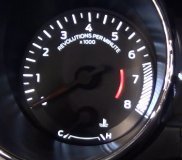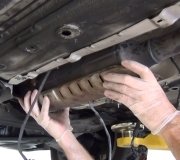To sum it up: almost two years ago to the day, my car got contaminated with ethanol and water. The car almost died. It was taking like 3k rpm just to maintain 60 mph, terribly weak, and it would almost stall when starting up or goosing the pedal to accelerate quickly. I replaced the fuel filter and that took care of most of the problem. But the car is still pretty weak.
What happens is I’ll hit the gas and it’s not as touchy as it was before this problem... Not as quick. In fact it’s really slow, like driving a Ford Fiesta or something. The half dozen mechanics I’ve taken it to think it’s fine. But it’s certainly not fine. My dealer thought it was fine before I replaced the fuel filter... When the car was taking 3000 rpm to get to 60. It may run well, but it’s not even close to as quick as it used to be. I bought the thing for the speed. Boxer engines are supposed to be quick off the gas.
Here’s a list of the repairs/service since then, some were necessary anyway:
tune up + new spark plugs
new fuel filter/pump (same assembly)
new battery (it was just about dead after all this)
air filter
drained fuel tank
new fuel pressure regulator
new mass air flow sensor
new oxygen sensor
new catalytic converter
replaced fuel filter again just in case
replaced transmission (it got burned out, needed to be replaced. Sounded like metal parts scraping together, gear slippage, etc.)
timing belt replacement (head gaskets were leaking too, so those got replaced at the same time)
new fuel lines
engine decompression test, which supposedly turned out negative for any problem. The pressure reading in a couple cylinders came out a touch higher than spec even. And he said the small difference in pressure shouldn’t be causing an issue. I wonder, though.
What little improvement was made after all this came after the oxygen sensor and fuel line replacements. Are there any other parts that come in direct contact with the fuel that I haven’t replaced, besides the engine?
I’m running out of options. Outside of the engine, the only systems left related to performance, that make sense, are the throttle and computer. I lean towards the throttle system as the next step, but I’m not a mechanic so I have no idea. I mean I did have to grind on it hard when this problem first occurred, almost pushing the pedal to the floor at times. After doing some research, I’ve come across the following throttle-related parts:
Cold Air Induction Kit/Cold air intake system
Throttle position sensor
Short ram intake?
MAP sensor?
Fuel injection air flow meter
Air/fuel ratio sensor
Fuel pressure gauge? Or is that the regulator I already replaced?
Could you explain the process of fuel delivery between the pedal and fuel injectors? And maybe rank these parts in the order of most likely problematic, if you had to guess?
I would be inclined to start the process of elimination with the pedal and move forward through the throttle system from there. I just have no idea what happens after the pedal. Maybe it’s something really simple about the pedal.
Could some electronic part have gotten knocked out of whack without triggering a code alarm? It’s electronic fuel injection.
I'm considering an engine replacement anyway, since I found an article on Pop Mechanics - "Can E15 Gasoline Really Damage Your Engine?"- That explained the reason behind my problem. It's called "phase separation."
(btw, someone is getting the bill for all these repairs)
Friday, July 1st, 2011 AT 8:32 PM


